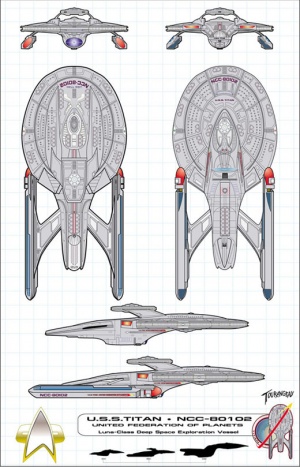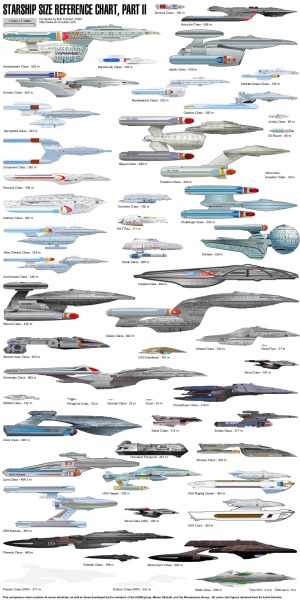
The Luna-class was designed by Dr. Xin Ra-Havreii, of Utopia Planitia Fleet Yards on Mars, and initially conceived for scientific exploration of the Gamma Quadrant following the discovery of the Bajoran Wormhole. The project was sidelined by the impending threat from the Dominion, then restarted following the end of the Dominion War.
The Luna-class ships were the top of the line in Starfleet's scientific and exploratory pursuits on behalf of the United Federation of Planets. Each had an average crew of the 350 individuals and was approximately 450 meters long. Their shuttlebays were reminiscent of the old Constitution-class shuttlebays, having a more rounded opening door. They also featured a longer "runway" for shuttles as they entered and exited the ship.
All Luna-class starships were named after moons. The first production lot was named after moons in the Sol system.

Personnel Compliment
Crew Compliment:
- 500 crew (85 Officers, 415 Enlisted Crew)
- Evacuation Limit: 8,000
Dimensions
- Overall Length 550m m
- Overall Beam (Width) 349 m
- Overall Draft (Height) 72.5 m
- Mass: 1,850,000 metric tons
- Decks 20 Total
Powerplant
- Class 10 Tandem Cores (rated for combined output of 2684 Teradynes.)
- Two nacelles with 32 Warp coils.
- Four Mark-X Impulse Fusion Reactors
Performance
Warp Speeds
- Normal Cruise: Warp Factor 8
- Maximum Cruise: Warp Factor 9.5 (50 hours)
- Maximum Rated: Warp Factor 9.9 for 24-30 Hours (requires a 24 hour core restart afterward)
Impulse Speeds
- Standard Cruse: .4c
- Maximuum Speed: .7c
- 58 Total RCS Thrusters, Starfleet Standard
Armament
- 10 x Type XII Phaser Arrays
- 3 x Type XXI Pulse Fire Combination Torpedo Launchers (2 Forward, 2 Aft)
- 5 x Type XII Phaser Arrays
- 3 x Torpedo Launchers + 450 Torpedoes (2 fore / 1 aft) (150 Quantum & 300 Photon)
- 250 x Quantum Torpedoes & 300 x Photon Torpdoes
- Extra Torpedo Warheads are stored in the Armory, and Torpedo Casings can be replicated as needed.
Defenses
- Multi-Layered Shielding System, Total Capacity: 2,800,000 TeraJoules
- Heavy Duranium/Tritanium Double Hull plus 30cm of Ablative Armor (50cm in some "key" areas)
- High-Level Structural Integrity Field
Transport Equipment
- 8 x Type 9 Shuttlecraft
- 4 x Type 11 Shuttlecraft
- 2 x Argo Transport Shuttles
- 10 x Workbee Repair and Maintenance Craft
- 1 x Volga Class Runabouts
Sensor Systems
Long Range
Emitter Location: LORASON Sensor Pod, Decks 1 - 4 Dorsal Exterior Controlled from Behind Main Deflector Array, Deck 16
- High Resolution Mode Range: 24 light years (with LORASON; 7 without)
- Low Resolution Mode Range: 60 light years (with LORASON; 21 without)
Primary instruments:
- Wide-angle active EM scanner
- Narrow-angle active EM scanner
- Pinpoint active EM scanner
- 2.5 meter diameter gamma ray telescope
- Variable frequency EM flux sensor
- Lifeform analysis instrument cluster
- Parametric subspace field stress sensor
- Gravimetric distortion scanner
- Passive neutrino imaging scanner
- Thermal imaging array
- Proximity sensor array type 11-A
Number of Pallets: 3
Pallet locations
- Primary: Saucer, deck 1 Dorsal Exterior
- Secondary: Saucer, deck 12 Ventral Exterior
- Tertiary: Stardrive, deck 19 Ventral Exterior
Primary instruments:
- Quasar telescope
- -Wide-angle IR Source Tracker
- Narrow-angle IR-UV-Gamma Ray Imager
- Active subspace multibeacon receiver
- Stellar graviton detectors
- High-energy charged particle detectors
- Galactic plasma wave cartographic processor
- Federation timebase beacon receiver
- Impulse time-distortion corrector
- Stellar pair coordinate imager
Lateral
Number of Arrays: 12
